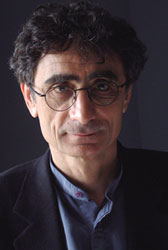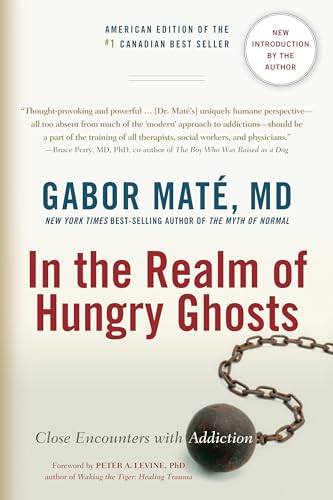In the Realm of Hungry Ghosts: Close Encounters with Addiction / MD Gabor Maté, Peter A. Levine Ph.D.,
| List Price: | |
Our Price: $13.59 | |
|
For Bulk orders
| |
|
Used Book Price: | |
| In the Realm of Hungry Ghosts: Close Encounters with Addiction / MD Gabor Maté, Peter A. Levine Ph.D., | |
| Publisher: North Atlantic Books | |
| Availability: | |
| Sales Rank: 2488 | |
|
Similar Books
Dear Amazon.com readers,

I've written In The Realm of Hungry Ghosts because I see addiction as one of the most misunderstood phenomena in our society. People--including many people who should know better, such as doctors and policy makers--believe it to be a matter of individual choice or, at best, a medical disease. It is both simpler and more complex than that.
Addiction, or the capacity to become addicted, is very close to the core of the human experience. That is why almost anything can become addictive, from seemingly healthy activities such as eating or exercising to abusing drugs intended for healing. The issue is not the external target but our internal relationship to it. Addictions, for the most part, develop in a compulsive attempt to ease one’s pain or distress in the world. Given the amount of pain and dissatisfaction that human life engenders, many of us are driven to find solace in external things. The more we suffer, and the earlier in life we suffer, the more we are prone to become addicted.
The inner city drug addicts I work with are amongst the most abused and rejected people amongst us, but instead of compassion our society treats them with contempt. Instead of understanding and acceptance, we give them punishment and moral disapproval. In doing so, we fail to recognize our own deeply rooted problems and thereby forego an opportunity for healing not only for them, the extreme addicts, but also for ourselves as individuals and as a culture.
My book, in short, is an attempt to bring light to core issues shrouded in darkness. The many positive responses I’ve received encourage me to believe that I’ve succeeded in making a contribution toward that goal.
Best wishes,
Gabor Maté
A Q&A with the Author
Question: The title of your book has its origins in the Buddhist Wheel of Life. In the Hungry Ghost Realm, people feel empty and seek solace from the outside, from sources that can never nourish. In what ways is our culture trapped in this realm? What can society learn from drug addicts who take the feelings of lack that everyone has, to the extreme?
Gabor Maté: Much of our culture and our economy are based on exploiting people’s sense of emptiness and inadequacy, of not being enough as we are. We have the belief that if we do this or acquire that, if we achieve this or attain that, we’ll be satisfied. This sense of lack and this belief feed many addictive behaviors, from shopping to eating to workaholism. In many respects we behave in a driven fashion that differs only in degree from the desperation of the drug addict.
Question: What makes your book so beautiful is its multi-layered, personal approach. You don’t rely solely on your patients’ stories, but also dig into your personal experience with addiction and the relevance of Buddha’s teachings. What were some challenges you faced when writing so frankly about your own addiction and your family?
Gabor Maté: In a sense my personal issues are not personal at all--just human. Once I understand something, I want to share it. There is no shame in having flaws--just challenges to keep learning. Many people have told me how much they have appreciated my being open like that--it helps them be open with themselves.
Question: Your book ends on a positive note, with the idea that brains do have the ability to change and grow in adult life and even to heal themselves. Does this undermine your previous assertion that you don’t expect most of your severely addicted patients to get clean?
Gabor Maté: No, there is no contradiction here. The human brain is exquisitely capable of development, a capacity known as neuroplasticity. But, as with all development, the conditions have to be right. My pessimism about my clients’ future is based not on any limitation of their innate potential, but on their dire social, economic and legal situation and on the essential indifference of policy makers--and of society--to their plight. In short, the resources that could go into rehabilitating people are now sunk, instead, into persecuting them and keeping them marginalized. It’s a failure of insight and of compassion. We are simply not living up to our possibilities as a society.
Read an Excerpt from In The Realm of Hungry Ghosts
I believe there is one addiction process, whether it manifests in the lethal substance dependencies of my Downtown Eastside patients, the frantic self-soothing of overeaters or shopaholics, the obsessions of gamblers, sexaholics and compulsive internet users, or in the socially acceptable and even admired behaviors of the workaholic. Drug addicts are often dismissed and discounted as unworthy of empathy and respect. In telling their stories my intent is to help their voices to be heard and to shed light on the origins and nature of their ill-fated struggle to overcome suffering through substance use. Both in their flaws and their virtues they share much in common with the society that ostracizes them. If they have chosen a path to nowhere, they still have much to teach the rest of us. In the dark mirror of their lives we can trace outlines of our own.
Now you can buy Books online in USA,UK, India and more than 100 countries.
*Terms and Conditions apply
Disclaimer: All product data on this page belongs to
 .
.No guarantees are made as to accuracy of prices and information.










